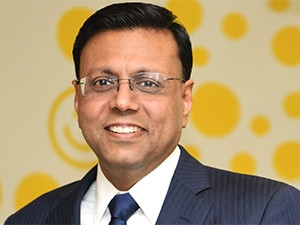
Sandeep Kishore has an interesting view on what plagues modern business. He delivered this view quite eloquently in the 2016 annual report of Zensar, the IT services company the Silicon Valley veteran has been leading for roughly five quarters:
"Of all the companies that invested in digital technologies to strengthen their competitiveness, only 40% could establish accountability measures (targets, incentives or 'owners' of digital programs). A high 93% of senior executives indicated that their organisations could not estimate the precise value they could extract from the digital initiatives. Only 4% of the companies that made digital investments could generate high returns at all."
Digital is notoriously intangible, but this issue goes deeper than the value of bits and bytes. The business technology market is currently moving in full swing, which means very little of what it offers has become commodities.
Storage, computing power and other infrastructure areas are headed that way, but the pricetag for what is being built on top of those layers still varies hugely between different propositions. This makes it very difficult for companies to determine exactly what they are getting out of paying for new digital doodads.
Return on digital
This is where Kishore's approach may raise some interest. On a recent visit to South Africa to bolster Zensar's local presence, he sat down with ITWeb to briefly explain his philosophy, Return On Digital.
Kishore did not take the reigns of a minnow. Under the leadership of Ganesh Natarajan since 2001, Zensar grew its revenues from $60 million to $400 million. Near the end of his tenure, it also attracted a substantial investment partner. Kishore needed to shift the gears on Zensar if it was to continue its solid rise.
"Zensar is unbelievably good at software delivery and creating an extension of customer IT. But how do we go to market in a world that is changing so rapidly and how do we position ourselves differently? It is about investing into relevancy. If you keep that in the centre of what we're trying to do, then we took a position of being, if not the first, then among the world's first 100% digital organisations."
Zensar would become 100% digital, splitting its functions across a family of platforms, accessed through Web portals and apps. Harnessing the company's software skills, he commissioned a platform called Zenverse. This app is effectively a direct line to Kishore, as well as a means to disseminate and respond to information across the company. It gives, in Kishore's words, equal stakes to all employees.
The world is so rapidly moving that these magical (mobile) phones will disappear faster than you think. What do you do then?
Sandeep Kishore
This has been followed with more apps covering different company functions. There is even a basic timesheet app. Zensar also embarked on an ambitious training regime, starting at the basics and scaling the learning requirements exponentially with each module. Staff response to this has been so aggressively positive that the company had to fast-track new module deployments.
Such an appetite is telling of what Kishore claims to be doing, which is to craft a new value system for the company based around digital tools:
"Everyone needs to come to the table and drive the organisation into a new orbit. It's not about digital. It's digital because that's what we see. But the world is so rapidly moving that these magical (mobile) phones will disappear faster than you think. What do you do then? What happens to these apps? So we are institutionalising that there is a new world coming."
Combine that with training - the type that scales and matches the interests of the staff - and it makes for quite an impactful recipe. According to Kishore, the core business function apps are already making big impacts. For example, over a period of three quarters, Zensar's daily sales outstanding - the amount of time it takes to collect revenue after making a sale - have been reduced by ten days. This increased the company's average cash flow by $20 million.
A new frame of thinking
Kishore is obviously also pitching this because it plays well with Zensar's marketing message. If it could create a tangible impact across its ecosystem, which can be traced back for half a century, imagine what it could do for customers. But marketing spin aside, Kishore does bring the point of seeing the value in digital. There is a solid philosophy at work here.
"Different people define digital in different ways. To me and our company, it's a new way of doing business, plain and simple. It's not about technology. It is a frame of thinking. What we're doing is to really drive a new frame of thinking within our organisation."
There is, of course, no shortage of companies claiming they will drive business impact through digital initiatives. Zensar is not necessarily any different. But at the very least, the aggressive journey it took to digitise its operations on a granular level, not to mention the immediate impact this has had on an already healthy company, is noteworthy.
Perhaps it is too soon to look for correlation in Zensar's bottom line. But the speed at which its staff took ownership of the changes is interesting: in 12 months, Zensar rolled out 25 digital platforms to cover core business processes, the apps of which have since been downloaded over 500 000 times internally by its 9 000 employees.
As with all boasts in the digital world, maybe a tiny pinch of salt should be added to the mix. Yet at the same time, it is tough to find companies in the midmarket-to-enterprise world that can claim anything similar. Kishore and Zensar may well be onto something truly significant here, perhaps even finally a reliable blueprint for the dreaded and quixotic Digital Transformation.
Share